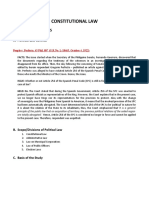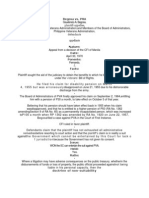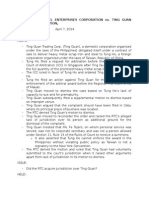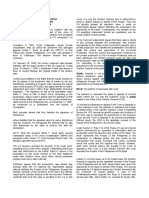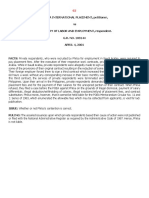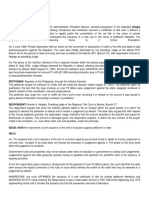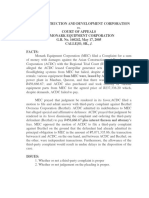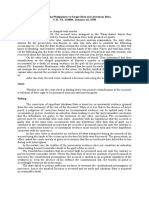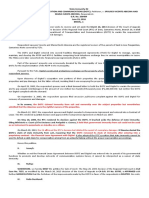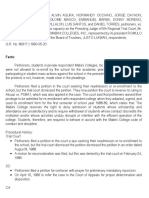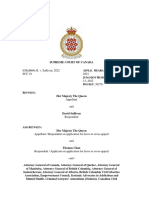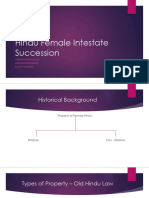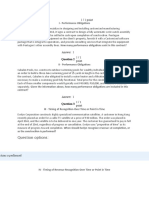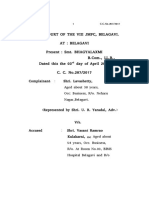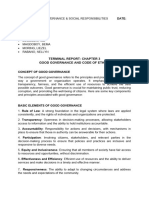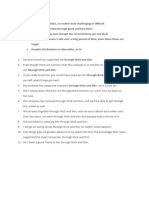University of San Agustin v. CA Digest
University of San Agustin v. CA Digest
Uploaded by
ImpactReportCopyright:
Available Formats
University of San Agustin v. CA Digest
University of San Agustin v. CA Digest
Uploaded by
ImpactReportCopyright
Available Formats
Share this document
Did you find this document useful?
Is this content inappropriate?
Copyright:
Available Formats
University of San Agustin v. CA Digest
University of San Agustin v. CA Digest
Uploaded by
ImpactReportCopyright:
Available Formats
University of San Agustin v.
CA (1994) Mandamus Rule 65 Facts The present case involves third year Nursing students who failed to meet the retention policy of the school, that is, minimum grade of 80% in any major Nursing subject and in two minor subjects. As a consequence, the school refused to re-admit them. Private respondents Antonio Marco Ho, Ma. Elaine Magante, Roy D. Sancho, Michael Kim So and Bernardita Cainoy were third year Nursing students of petitioner University of San Agustin (USA) who were refused re-admission in the summer classes of 1989 and last two semesters of school year 1989-1990 on the alleged ground that they failed to obtain grades of not lower than 80% in Nursing 104 (Nursing Practice II with Related Learning Experience).
Its persistent refusal to re-admit them prejudiced their right to freely choose their field of study and finish a college degree and worse, no other school within the city and nearby areas is willing to accept them due to the difference in the curriculum and school residency requirement. Thus, they filed a petition for mandamus before the Regional Trial Court of Iloilo City, to command petitioner USA to re-admit them. Submitting a joint answer to the petition, petitioner USA and the other petitioners, Dean Concepcion Cajilig and Clinical Instructors Nenalyn Abioda, Mary Espino, Rhodora Azucena, Ma. Dulce Socorro Posa and Cosette Monteblanco admitted having barred private respondents from finishing their Nursing course but justified the decision not to re-admit them as being in pursuance of the school's policy that only students with grades of at least 80% in any major Nursing subject, including Nursing 104, and two minor subjects, are allowed enrollment in the following year. Private respondents were duly informed and forewarned of their below 80% performance rating. To buttress petitioner's stance, they placed reliance on Section 9(2) of the Education Act of 1982 (B.P. Blg. 232) which recognizes the right of students to freely choose their field of study subject to existing curricula, and to continue their course up to graduation, except in cases of academic deficiency or violation of disciplinary regulations; and Section 13(2) thereof vesting in institutions of higher learning the right to determine on academic grounds who shall be admitted to study, who may teach, and what shall be the subjects of study and research. Additionally, petitioners contended that private respondents have no cause of action for mandamus under the premises because there is no clear and well-defined right of the latter which has been violated neither do the former have a corresponding ministerial duty to readmit them, since petitioner USA is a private educational institution not performing public functions and duties. Under the Manual of Regulations for Private Schools, petitioner USA enjoys the right to academic freedom. The RTC ruled that mandamus will not lie to compel the respondents to enroll petitioning students because of their academic deficiencies and that this refusal of respondents university falls within its right to do so under the academic freedom clause of our Constitution. The CA did not agree with the ruling of the trial court.
Issue
Held
Whether or not the students can compel the school to allow them to complete their course? No. Mandamus does not lie. We rule that the special civil action of mandamus is not available in this instance. The petition which was filed by private respondents before the trial court sought the issuance of a writ of mandamus, to command petitioners to admit them for enrollment. Taking into account the admission of private respondents that they have finished their Nursing course at the Lanting College of Nursing even before the promulgation of the questioned decision, this case has clearly been overtaken by events and should therefore be dismissed. However, even if a case were moot and academic, a statement of the governing principle is appropriate in the resolution of dismissal for the guidance not only of the parties but of others similarly situated. We shall adhere to this view and proceed to dwell on the merits of this petition. Under Rule 65, Section 3 of the Rules of Court, mandamus lies under any of the following cases: (1) against any tribunal which unlawfully neglects the performance of an act which the
law specifically enjoins as a duty; (2) in case any corporation, board or person unlawfully neglects the performance of an act which the law enjoins as a duty resulting from an office, trust or station; and (3) in case any tribunal, corporation, board or person unlawfully excludes another from the use and enjoyment of a right or office to which such other is legally entitled; and there is no other plain, speedy and adequate remedy in the ordinary course of law.
The nature of mandamus has been the subject of discussions in several cases. It is settled that mandamus is employed to compel the performance, when refused, of a ministerial duty, this being its main objective. It does not lie to require anyone to fulfill contractual obligations or to compel a course of conduct, nor to control or review the exercise of discretion. On the part of the petitioner, it is essential to the issuance of a writ of mandamus that he should have a clear legal right to the thing demanded and it must be the imperative duty of the respondent to perform the act requiredIt is simply a command to exercise a power already possessed and to perform a duty already imposed. In the present case, private respondents have failed to satisfy the prime and indispensable requisites of a mandamus proceeding. There is no showing that they possess a clear legal right to be enrolled in petitioner USA. Moreover, assuming that petitioner USA has an imperative duty to enroll them, it does not appear to this Court that the duty is merely ministerial; rather, it is a duty involving the exercise of discretion. This was likewise our ruling in the case of Tangonan v. Pao et al., which involves a factual setting similar to the present petition. We adopted as our own the rationalization of the trial court therein: . . . . Every school has a right to determine who are the students it should accept for enrolment. It has the right to judge the fitness of students. While petitioner questions the findings of respondent school as to her academic competence, the Court cannot find any legal jurisdiction to interfere in the exercise of judgment of the school on this matter. . .. Equally mandated by Article XIV, Section 5(2) of the 1987 Constitution is that academic freedom shall be enjoyed in all institutions of higher learning. Academic freedom of educational institutions has been defined as the right of the school or college to decide for itself, its aims and objectives, and how best to attain them free from outside coercion or interference save possibly when the overriding public welfare calls for some restraint. It has a wide sphere of autonomy certainly extending to the choice of students. Said constitutional provision is not to be construed in a niggardly manner or in a grudging fashion. That would be to frustrate its purposes and nullify its intent.
You might also like
- Case Digests Compilation For Constitutional Law (Nachura)Document45 pagesCase Digests Compilation For Constitutional Law (Nachura)Frev EspinaNo ratings yet
- Notes On Data Privacy Act of 2012 (RA 10173)Document14 pagesNotes On Data Privacy Act of 2012 (RA 10173)edrianclyde100% (8)
- Digest - Mirasol v. Court of Appeals, G.R. No. 128448, February 1, 2001Document2 pagesDigest - Mirasol v. Court of Appeals, G.R. No. 128448, February 1, 2001Vic RabayaNo ratings yet
- Digest - Accfa vs. Cugco, G.R. L-21484 - 30 Scra 649Document5 pagesDigest - Accfa vs. Cugco, G.R. L-21484 - 30 Scra 649Clare Garcia100% (1)
- Angara V. Elecom G. R. No. L-45081 July 15, 1936 Laurel, J.: FactsDocument2 pagesAngara V. Elecom G. R. No. L-45081 July 15, 1936 Laurel, J.: Factsatwe100% (1)
- Begosa V Pva (D)Document2 pagesBegosa V Pva (D)Eunice Ignacio0% (1)
- Occena VS COMELEC-Case DigestDocument2 pagesOccena VS COMELEC-Case DigestlmlNo ratings yet
- COMMO. LAMBERTO TORRES (RET) v. SANDIGANBAYANDocument1 pageCOMMO. LAMBERTO TORRES (RET) v. SANDIGANBAYANLara CacalNo ratings yet
- People Vs Gozo DigestDocument1 pagePeople Vs Gozo DigestAdriel Magpile0% (2)
- B29 City of Manila vs. Melba Tan TeDocument2 pagesB29 City of Manila vs. Melba Tan TeKen MarcaidaNo ratings yet
- David v. Arroyo DigestDocument3 pagesDavid v. Arroyo DigestRochelle Ann Reyes100% (4)
- Republic v. Roque - Case DigestDocument1 pageRepublic v. Roque - Case DigestMay Angelica TenezaNo ratings yet
- Consti2digest - Accfa Vs Cugco, G.R. No. L-21484 (29 Nov 1969)Document1 pageConsti2digest - Accfa Vs Cugco, G.R. No. L-21484 (29 Nov 1969)Lu Cas0% (1)
- FA000 - How To Apply For A License To Sell (LTS) in The Philippines - WIP - AIR - v001Document6 pagesFA000 - How To Apply For A License To Sell (LTS) in The Philippines - WIP - AIR - v001baoshi3382No ratings yet
- Tangonan Vs Cruz PanoDocument27 pagesTangonan Vs Cruz PanonchlrysNo ratings yet
- 26.tung Ho Steel Vs Ting GuanDocument2 pages26.tung Ho Steel Vs Ting GuanEl Sitas50% (2)
- Mateo Vs Romulo, Et AlDocument2 pagesMateo Vs Romulo, Et AlElvis Jagger Abdul JabharNo ratings yet
- ATO V Sps. Ramos (Case Digest)Document1 pageATO V Sps. Ramos (Case Digest)haruhime0867% (3)
- DAR Vs Vicente UyDocument2 pagesDAR Vs Vicente UyFzlBuctuan100% (2)
- V. Bank of The Philippine Islands (Bpi), RespondentDocument2 pagesV. Bank of The Philippine Islands (Bpi), RespondentLuna Baci100% (2)
- DECS Vs SantiagoDocument2 pagesDECS Vs SantiagoFyrsed Alsad Alfad IIINo ratings yet
- Gochan V GochanDocument7 pagesGochan V GochanIvan Montealegre Conchas100% (2)
- PEOPLE v. ARTURO DUCADocument2 pagesPEOPLE v. ARTURO DUCAAaliyah100% (2)
- Republic Vs de Borja DigestDocument1 pageRepublic Vs de Borja DigestBarrrMaiden100% (1)
- Reno Foods Inc Vs - Nlm-KatipunanDocument2 pagesReno Foods Inc Vs - Nlm-Katipunanelizabethmae100% (1)
- Topacio v. Ong DigestDocument2 pagesTopacio v. Ong DigestJaerelle HernandezNo ratings yet
- UP Vs AysonDocument2 pagesUP Vs AysonAnonymous 5MiN6I78I0100% (2)
- Admin Cases 62-65Document7 pagesAdmin Cases 62-65Diana Constantino-RocaberteNo ratings yet
- GR No. 191590Document3 pagesGR No. 191590.100% (1)
- Venzon Vs Rural Bank of BuenavistaDocument2 pagesVenzon Vs Rural Bank of Buenavistacyhaaangelaaa100% (1)
- 1 Utak Vs ComelecDocument1 page1 Utak Vs ComelecHarold EstacioNo ratings yet
- 54 Department of Agriculture V NLRC Case DigestDocument3 pages54 Department of Agriculture V NLRC Case DigestRexNo ratings yet
- 21 - Republic Vs HidalgoDocument2 pages21 - Republic Vs HidalgoAngelo Raphael B. Delmundo100% (2)
- Mahilum Vs Ilano GR No 197923 - Case DigestDocument2 pagesMahilum Vs Ilano GR No 197923 - Case DigestJo Hannah Naranjo SullanoNo ratings yet
- Festejo VDocument4 pagesFestejo VAbegail De LeonNo ratings yet
- NICOS Industrial Corp Vs CADocument1 pageNICOS Industrial Corp Vs CACarlota Nicolas Villaroman100% (1)
- Lee Yick Hon - CustomsDocument13 pagesLee Yick Hon - CustomsVin Bautista100% (1)
- 08 G.R. No. 160242Document2 pages08 G.R. No. 160242Mabelle ArellanoNo ratings yet
- DA v. NLRC DigestDocument2 pagesDA v. NLRC DigestCray Calibre100% (4)
- People vs. ManahanDocument1 pagePeople vs. ManahanJopet EstolasNo ratings yet
- Maquiling Vs COMELEC GR No 195649Document1 pageMaquiling Vs COMELEC GR No 195649Lylo BesaresNo ratings yet
- 2 PP Vs Bato Case DigestDocument1 page2 PP Vs Bato Case DigestRicaNo ratings yet
- Manila Banking Co. vs. University of BaguioDocument2 pagesManila Banking Co. vs. University of BaguioMarianne Andres100% (2)
- Isabelito Vs Perpetual Help College of RizalDocument1 pageIsabelito Vs Perpetual Help College of RizalAngela BauNo ratings yet
- Dycoco Vs CADocument1 pageDycoco Vs CAkonvanNo ratings yet
- GR. No. 111709 PP Vs Tulin Aug. 30, 2001 FactsDocument2 pagesGR. No. 111709 PP Vs Tulin Aug. 30, 2001 FactsCamella AgatepNo ratings yet
- Case Digest NHA Vs HeirsDocument2 pagesCase Digest NHA Vs HeirswonologuesNo ratings yet
- Department of Transportation and Communication v. Sps. Abecina, G.R. No. 206484, June 29, 2016 DigestDocument2 pagesDepartment of Transportation and Communication v. Sps. Abecina, G.R. No. 206484, June 29, 2016 DigestAbilene Joy Dela Cruz67% (3)
- Duduaco v. LaquindanumDocument2 pagesDuduaco v. LaquindanumPer-Vito DansNo ratings yet
- G.R. No. 153675 DigestDocument2 pagesG.R. No. 153675 DigestK Manghi100% (1)
- G.R. No. 160239 Case DigestDocument2 pagesG.R. No. 160239 Case DigestMaricel SorianoNo ratings yet
- REPUBLIC vs. LARRAZABALDocument2 pagesREPUBLIC vs. LARRAZABALOrange Zee Meline0% (1)
- LU YM V Mahinay-1Document2 pagesLU YM V Mahinay-1MilesNo ratings yet
- Digest - Lacson vs. The Executive SecretaryDocument2 pagesDigest - Lacson vs. The Executive SecretaryPaul Vincent CunananNo ratings yet
- (BALIGOD) Tablarin vs. Judge Gutierrez, 152 SCRA 730Document1 page(BALIGOD) Tablarin vs. Judge Gutierrez, 152 SCRA 730LeyardNo ratings yet
- University of San Agustin v. CADocument3 pagesUniversity of San Agustin v. CARaynold deltaNo ratings yet
- B. University of San Agustin vs. CADocument14 pagesB. University of San Agustin vs. CArhuejanem21No ratings yet
- University of San Agustin vs. CADocument11 pagesUniversity of San Agustin vs. CAHal JordanNo ratings yet
- Freedom DigestsDocument14 pagesFreedom DigestsSumpong BrgyNo ratings yet
- Ariel Non V Sancho Danes GDocument4 pagesAriel Non V Sancho Danes GAnsis Villalon Pornillos100% (1)
- Non v. Danes II, G.R. No. 89317, May 20, 1990 As Cited in San Beda (2013)Document6 pagesNon v. Danes II, G.R. No. 89317, May 20, 1990 As Cited in San Beda (2013)Joyce Anne BobilesNo ratings yet
- Non v. DamesDocument4 pagesNon v. DamesRaymondNo ratings yet
- Letter Complaint IlihanDocument2 pagesLetter Complaint IlihanLyn Olita100% (1)
- Bid Notice Abstract: Invitation To Bid (ITB)Document2 pagesBid Notice Abstract: Invitation To Bid (ITB)Christian CapioNo ratings yet
- PluralNounsGameandWorksheet 1Document9 pagesPluralNounsGameandWorksheet 1sasa_mitricNo ratings yet
- Supreme Court of Canada Ruling On Thomas ChanDocument66 pagesSupreme Court of Canada Ruling On Thomas ChanPeterborough ExaminerNo ratings yet
- Female Hindu Intestate SuccessionDocument17 pagesFemale Hindu Intestate SuccessionAnanya UpadhyeNo ratings yet
- Keeping Peace & Good BehaviourDocument5 pagesKeeping Peace & Good BehaviourNeha SahNo ratings yet
- Assignment Open Ended QuestionsDocument11 pagesAssignment Open Ended QuestionsRina Mae Sismar Lawi-an100% (1)
- Conviction in Cheque Bounce CaseDocument24 pagesConviction in Cheque Bounce CaseArvind PatilNo ratings yet
- Conflict of Laws Relating To ContractsDocument14 pagesConflict of Laws Relating To ContractsIshmael OneyaNo ratings yet
- General Assembly: Report of The Human Rights Council On Its Twenty-Seventh Special SessionDocument12 pagesGeneral Assembly: Report of The Human Rights Council On Its Twenty-Seventh Special SessionShardul SinghNo ratings yet
- The Khasi Hills Autonomous District (Khasi Social Custom of Lineage) Act, 1997Document13 pagesThe Khasi Hills Autonomous District (Khasi Social Custom of Lineage) Act, 1997Avantika ChavanNo ratings yet
- TN LLB Syllabus Book 3 Yrs-26-30Document5 pagesTN LLB Syllabus Book 3 Yrs-26-30HEMALATHA SNo ratings yet
- Colegio de San Gabriel Arcangel: Lesson ModuleDocument35 pagesColegio de San Gabriel Arcangel: Lesson ModuleC XNo ratings yet
- Oath of Amateurism: 4. Conduct of The GamesDocument3 pagesOath of Amateurism: 4. Conduct of The GamesMar Zeus KatigbakNo ratings yet
- Laborcases 4Document43 pagesLaborcases 4Pauline VillanuevaNo ratings yet
- Vidya Sagar: Ca FoundationDocument13 pagesVidya Sagar: Ca FoundationSakshiK ChaturvediNo ratings yet
- G3 Good Governance and Code of EthicsDocument8 pagesG3 Good Governance and Code of EthicsKim Diah Macagumban DiasemenNo ratings yet
- Quimen v. CA 257 SCRA 163 DOCTRINE: Where The Easement May Be Established On Any of Several Tenements SurroundingDocument11 pagesQuimen v. CA 257 SCRA 163 DOCTRINE: Where The Easement May Be Established On Any of Several Tenements SurroundingVillar John EzraNo ratings yet
- SWLC21 Series Instructions PDFDocument2 pagesSWLC21 Series Instructions PDFDestiny BadeauxNo ratings yet
- Nfpa 13 13r and 13d DifferencesDocument2 pagesNfpa 13 13r and 13d DifferencesArgile-asshole100% (1)
- Comparative Study Between Islamic and WeDocument7 pagesComparative Study Between Islamic and WeQasim Sher HaiderNo ratings yet
- Through Thick and ThinDocument8 pagesThrough Thick and ThinMagdaNo ratings yet
- The Tamil Nadu Safety Officers (Duties, Qualifications and Conditions of Service) Rules, 2005Document7 pagesThe Tamil Nadu Safety Officers (Duties, Qualifications and Conditions of Service) Rules, 2005Manikandan.k KandanNo ratings yet
- PETER B. v. CENTRAL INTELLIGENCE AGENCY Et Al - Document No. 10Document23 pagesPETER B. v. CENTRAL INTELLIGENCE AGENCY Et Al - Document No. 10Justia.comNo ratings yet
- RERA Presentation For 30th June-MinDocument48 pagesRERA Presentation For 30th June-MinManish MiglaniNo ratings yet
- Application Form For Original - Certificate - CuDocument2 pagesApplication Form For Original - Certificate - CuSantanu MukherjeeNo ratings yet
- Cir msc402 Bmu 83Document7 pagesCir msc402 Bmu 8309444727373kzlNo ratings yet
- Interpretation of Vietnamese Legal Requirements For Qualification of Contractor and Third Party To Perform ExperimentsDocument3 pagesInterpretation of Vietnamese Legal Requirements For Qualification of Contractor and Third Party To Perform ExperimentsVõ Quang KiệtNo ratings yet
